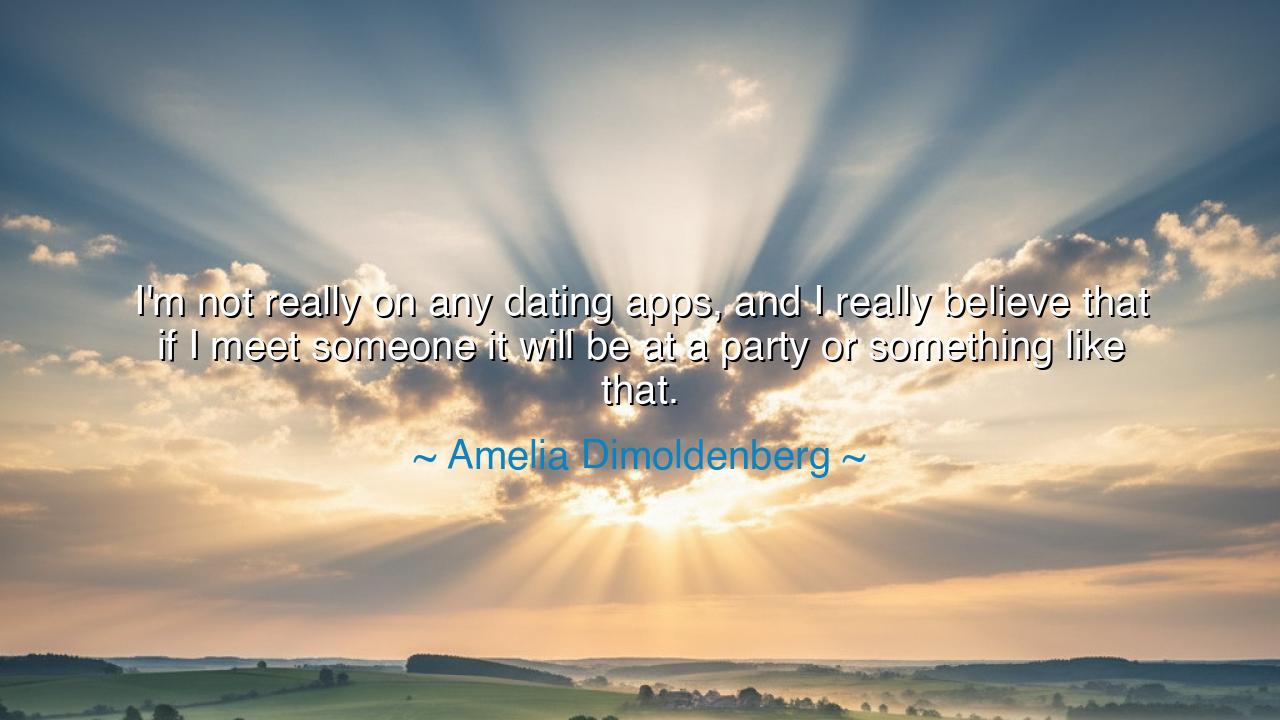
I'm not really on any dating apps, and I really believe that if I
I'm not really on any dating apps, and I really believe that if I meet someone it will be at a party or something like that.






The words of Amelia Dimoldenberg — “I’m not really on any dating apps, and I really believe that if I meet someone it will be at a party or something like that.” — carry the quiet confidence of one who trusts in fate more than in algorithms, in connection more than convenience. Beneath their light and modern tone lies an ancient belief, one as old as human gathering itself: that true encounters are not engineered but discovered, that the heart’s meeting with another is not the result of calculation, but of timing, presence, and serendipity. In her refusal to surrender love to machines, Amelia speaks the language of the ancients — who believed that destiny moves most freely when life is lived with openness, not with control.
In the world she inhabits, where countless faces scroll past with the flick of a thumb, her stance feels like an act of rebellion. Yet it is not rebellion against progress, but a return to authenticity — to the sacred simplicity of meeting someone not through a screen, but through shared laughter, through music, through the unpredictable rhythm of real life. A party, in her words, is not merely a place of festivity, but a symbol — a gathering of souls where spontaneity reigns, where the heart may stumble upon another heart unexpectedly. To believe in such encounters is to affirm faith in human energy, in the spark that arises when eyes meet, when conversation flows without pretense or profile.
The ancients understood this power of the spontaneous meeting. They spoke often of the kairos, the divine moment when fate and readiness converge. It was said that love, like lightning, does not strike upon command but when the air itself becomes charged with possibility. Consider the tale of Paris and Helen, whose meeting was foretold by the gods, yet occurred through chance — a moment of hospitality that changed the course of history. Or think of Antony and Cleopatra, whose first encounter aboard her golden ship turned the tide of empires. None of these meetings were planned, yet each carried the weight of destiny. In their unpredictability, they reveal a truth Amelia herself echoes: that love is not summoned by effort alone, but by presence — by being alive and awake to the moment when fate whispers.
And yet, Dimoldenberg’s words also hint at patience — that rare virtue in a time of instant gratification. To say “I really believe” is to express faith not only in others, but in time itself. She trusts that the right encounter will come when it is meant to, not when it is forced. This patience reflects a wisdom that even philosophers like Lao Tzu and Epictetus taught: that rushing toward what we desire often drives it farther away. The river flows to the sea not by demanding the tide, but by following its natural course. So too, the heart finds love not through restless seeking, but through alignment — when one’s life, character, and readiness meet the other’s in perfect harmony.
There is, too, humility in her words — a humility that honors the mystery of connection. In an age where people curate their identities for digital approval, Amelia stands as a reminder that love, in its truest form, cannot be optimized. It is a meeting of souls, not search results. The party, the something like that, are symbols of unpredictability — of life’s refusal to be reduced to patterns. To believe in meeting someone by chance is to accept that love, like all sacred things, resists control. It comes not through strategy, but through grace.
The lesson in this saying reaches beyond romance — it is a call to live more openly, more presently, more bravely. It teaches that not everything worth finding can be sought by formula or technology. Whether in love, friendship, or destiny, some treasures reveal themselves only when we stop searching and start being. Thus, the seeker must learn to dwell in the world with eyes unguarded and spirit unhurried, to show up to life as one shows up to a dance — not knowing who one might meet, but trusting that the rhythm will lead them where they are meant to go.
So let those who hear these words remember: life’s greatest connections often begin where control ends. Step out from behind the glass of the digital world. Go to the gathering, attend the celebration, walk the unknown road. Laugh freely. Speak to strangers. Trust that fate, like a skilled weaver, is already at work behind the veil. For as Amelia Dimoldenberg reminds us, love is not summoned through swipes or searches — it arrives in the radiant chaos of the real, often when we least expect it, yet always when we are most ready to receive it.






AAdministratorAdministrator
Welcome, honored guests. Please leave a comment, we will respond soon